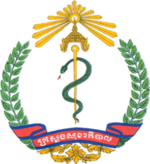Issue Description
Cambodia has experienced considerable success in improving healthcare standards and access across the country. A critical component of the success of Cambodia’s healthcare strategy has been an effective immunisation programme, undertaken with the support of the World Health Organisation (WHO), to prevent the spread of vaccine-preventable diseases such as polio, measles, rubella and others.
Due to heightened safety concerns and the complexity of manufacturing and testing, the importation of vaccines and other biological medicinal products into Cambodia is stricter than other healthcare products. These concerns have led the Ministry of Health to recently implement tighter restrictions on the medical companies that deal with biological products. The Ministry has stipulated that they will only grant import licences for products that appear on the WHO Prequalified Vaccines List, which is significantly reducing the availability and range of biological products in Cambodia.
The WHO compiles the Prequalified Vaccines List as a service to the United Nations (UN) agencies that purchase vaccines to determine the acceptability of vaccines from different sources, and reflects the products that are required by their respective tenders and that have been submitted for evaluation13. The WHO states that it does not intend for this to be an exhaustive list of products used in the treatment of diseases, and that if a product has not been included, it does not mean it would not comply with their standards if submitted for evaluation13. Similarly, if a product is included on the List, it does not imply approval of the product or manufacturing site by the WHO, as this responsibility lays with the national authorities of vaccine exporting countries and there is no guarantee that the products will continue to meet WHO standards.
Importantly, the WHO Prequalified List also relies on the scientific assessment and inspections conducted by the European Medicines Agency (EMA) as a basis for prequalified listing. Therefore, if a product required by a UN agency has already been evaluated by either of these authorities, the WHO does not require their own evaluation to take place before listing as the WHO recognises that EMA have the capabilities and capacity to confirm a product’s safety and effectiveness.
Impact on business
While we recognise that the Ministry has implemented this additional constraint to ensure that the biological products available are safe and effective as defined by the WHO, due to the limitations of the List and its varied demands, the need for all products to be listed before they can be imported severely restricts patient access to treatments. As the inclusion of new treatments is entirely dependent on the needs of the UN agencies that rely on the WHO List, it will be inconsistent with the specific and changing healthcare needs of Cambodia, and can quickly become outdated due to the fast pace of scientific developments. Consequently, if a new treatment is released to market, there is an expectation that it will be some time before it will be seen on the List due to the heavy administrative processes involved, which may prevent Cambodian citizens from accessing innovative, life-saving treatments.
Restricting the availability of new treatments to those on the WHO List also negatively impacts the cost of biological products in Cambodia by limiting competition. Alternative treatments that are also proven to be safe and effective are unable to compete for market share, allowing distributors to maintain their high prices for the products that are on the List. Similarly, as the WHO List specifies the required dosage, only versions of the product that match the exact dosage will be approved for import, which reduces the ability for hospitals and clinics to receive competitive prices and achieve economies of scale by purchasing in bulk.
Recommendation
- Widen the acceptance of biological products to include those approved by the European Medicines Agency.
We suggest that the Ministry of Health widen the acceptance of biological products approved for import to include products that have already been approved by the EMA. As the WHO itself is not a regulatory entity and already bases listing approvals on the evaluations of the EMA, the Ministry will retain the high level of regulatory oversight required to ensure that only safe and effective products enter Cambodia, while increasing patient access to innovative treatments and allowing hospitals to take advantage of cost-saving strategies.
Royal government of Cambodia
Initiative from Eurocham: The issue has been raised by the Healthcare Committee within The White Book edition 2024 in the Recommendation No. 41.

National Counterparts

Ministry of Health

